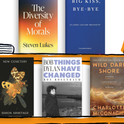The Rule of Law (2010)By Tom Bingham
Tom Bingham [who died in early September] was until recently Britain’s most senior judge. It shows that the highest level of the judiciary is interested in the liberty of the individual and freedom.
Bingham criticises the US putting prisoners outside the reach of their courts in Guantanamo Bay and mentions the executive in England did the same thing more than 300 years ago. The Earl of Clarendon, King Charles II’s chief minister, locked up people he didn’t approve of without them being able to force the government to explain why they were being held. After he died there was an act of parliament to stop it, the Habeas Corpus Amendment Act of 1689.
The book looks at aspects of the law which effectively guarantee the freedom of the individual. Law determines the rules which everyone, including the authorities, must follow and is the greatest guarantee of freedom.
Flat Earth News (2008)By Nick Davies
Flat Earth News is the first book by a top-quality journalist to completely expose the way in which the media distort what’s going on. Usually, all institutions are open to criticism by the media, except the media themselves.
What emerges is that journalists lose fairly early on, or a lot of them do, the fundamental purpose of their job, which is to tell the truth. The profession exists to inform the public of things about which it would not otherwise have known. That’s not necessarily why people buy newspapers, but it is the basic task of journalism. And failure to tell the truth, and a willingness to distort, is widespread.
The problem is that what they are doing is writing fiction dressed up as fact. I think that is the fundamental point. If they printed the story in a different colour when it was wholly or partly invented that would be less objectionable.
News of the World? Fake Sheikhs and Royal Trappings (2008) By Peter Burden
This book confirms things I have long suspected. For example, Burden cites two instances of couples who were exposed by the News of the World as swingers. They were ordinary people and in both cases the husband committed suicide. It’s clear that this didn’t bother the paper, and on top of that Burden gives endless examples of where it has broken the law. There’s a quote on the front: “That is what we do. We go out and destroy other people’s lives.”
Other people’s lives, particularly sex lives, are interesting, but you have to weigh the suffering you cause to those you expose against the minor pleasure you give to the reader of the newspaper. The newspaper is selling the privacy of those people, which doesn’t belong to it. And once something is out in the open, you can’t make it private again and take it out of people’s minds.
Bounce: How Champions are Made (2010) By Matthew Syed
Syed was Britain’s number one table-tennis player and he’s now a sports journalist on the Times. The conventional view, and my view before reading this book, is that some people are supremely gifted and therefore rise to the top of sport. But Syed says talent has got little to do with success and it’s all to do with circumstances and practice.
In his own case, Syed had an older brother who liked playing table tennis and his parents bought a full-size table. He then started playing hour after hour with his brother and, by chance, the school down the road had a coach who was one of Britain’s top table-tennis coaches. It ended up that half the top table-tennis players in Britain came from this one little street in Reading.
This book is not about privacy but one can say that, given a degree of privacy, I now have the time to read the sort of books that fascinate me.
Brainwash: The Secret History of Mind Control (2007)By Dominic Streatfeild
Brainwash is a review of all the means of influencing people’s thinking, primarily without their consent. So, you’ve got things like hypnotism, interrogation, religious cults, the Moonies. Obviously you can get anyone to say anything if you torture them, but you can also get anyone to say anything if you’ve got enough time and put enough pressure on them because everyone has a breaking point.
A very tenuous link to privacy would be to illustrate how you create a culture in which it’s all right to torture people morally by exposing their private life, when no one would agree to them being tortured physically. Paul Dacre, editor of the Daily Mail, has written that what I did was “unimaginable depravity.” So I wonder what he thinks is ordinary depravity, and I speculate that it’s leaving the light on during sex.
Interview by Anna Blundy for the website FiveBooks
Tom Bingham [who died in early September] was until recently Britain’s most senior judge. It shows that the highest level of the judiciary is interested in the liberty of the individual and freedom.
Bingham criticises the US putting prisoners outside the reach of their courts in Guantanamo Bay and mentions the executive in England did the same thing more than 300 years ago. The Earl of Clarendon, King Charles II’s chief minister, locked up people he didn’t approve of without them being able to force the government to explain why they were being held. After he died there was an act of parliament to stop it, the Habeas Corpus Amendment Act of 1689.
The book looks at aspects of the law which effectively guarantee the freedom of the individual. Law determines the rules which everyone, including the authorities, must follow and is the greatest guarantee of freedom.
Flat Earth News (2008)By Nick Davies
Flat Earth News is the first book by a top-quality journalist to completely expose the way in which the media distort what’s going on. Usually, all institutions are open to criticism by the media, except the media themselves.
What emerges is that journalists lose fairly early on, or a lot of them do, the fundamental purpose of their job, which is to tell the truth. The profession exists to inform the public of things about which it would not otherwise have known. That’s not necessarily why people buy newspapers, but it is the basic task of journalism. And failure to tell the truth, and a willingness to distort, is widespread.
The problem is that what they are doing is writing fiction dressed up as fact. I think that is the fundamental point. If they printed the story in a different colour when it was wholly or partly invented that would be less objectionable.
News of the World? Fake Sheikhs and Royal Trappings (2008) By Peter Burden
This book confirms things I have long suspected. For example, Burden cites two instances of couples who were exposed by the News of the World as swingers. They were ordinary people and in both cases the husband committed suicide. It’s clear that this didn’t bother the paper, and on top of that Burden gives endless examples of where it has broken the law. There’s a quote on the front: “That is what we do. We go out and destroy other people’s lives.”
Other people’s lives, particularly sex lives, are interesting, but you have to weigh the suffering you cause to those you expose against the minor pleasure you give to the reader of the newspaper. The newspaper is selling the privacy of those people, which doesn’t belong to it. And once something is out in the open, you can’t make it private again and take it out of people’s minds.
Bounce: How Champions are Made (2010) By Matthew Syed
Syed was Britain’s number one table-tennis player and he’s now a sports journalist on the Times. The conventional view, and my view before reading this book, is that some people are supremely gifted and therefore rise to the top of sport. But Syed says talent has got little to do with success and it’s all to do with circumstances and practice.
In his own case, Syed had an older brother who liked playing table tennis and his parents bought a full-size table. He then started playing hour after hour with his brother and, by chance, the school down the road had a coach who was one of Britain’s top table-tennis coaches. It ended up that half the top table-tennis players in Britain came from this one little street in Reading.
This book is not about privacy but one can say that, given a degree of privacy, I now have the time to read the sort of books that fascinate me.
Brainwash: The Secret History of Mind Control (2007)By Dominic Streatfeild
Brainwash is a review of all the means of influencing people’s thinking, primarily without their consent. So, you’ve got things like hypnotism, interrogation, religious cults, the Moonies. Obviously you can get anyone to say anything if you torture them, but you can also get anyone to say anything if you’ve got enough time and put enough pressure on them because everyone has a breaking point.
A very tenuous link to privacy would be to illustrate how you create a culture in which it’s all right to torture people morally by exposing their private life, when no one would agree to them being tortured physically. Paul Dacre, editor of the Daily Mail, has written that what I did was “unimaginable depravity.” So I wonder what he thinks is ordinary depravity, and I speculate that it’s leaving the light on during sex.
Interview by Anna Blundy for the website FiveBooks











